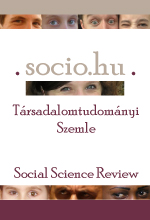Az Ezüst Generáció a munkaerőpiacon. A 65+ generáció munkavállalása és időgazdálkodása
Silver Generation on the labour market. Work & Time Management of the 65+ Generation
Author(s): Judit Csoba, Tibor LadancsikSubject(s): Human Ecology, Gerontology, Sociology of Politics
Published by: MTA TK Szociológiai Intézet
Keywords: silver economy; senior employment; time budget of the 65+ generation; labour market motivations
Summary/Abstract: Nowadays, the investigation of the labour market challenges generated by an aging society is one of the central subjects in the international academic literature. Previous research mostly analysed the labour market presence of people aged between 55 and 65. However, as the extension of the retirement age is on the agenda in several European countries, the work ability and willingness of the 65+ generation has become a key issue. Our survey, conducted in Hajdú-Bihar county, North-Eastern Hungary (N=2625, multi-stage probability sample), focuses on this relatively less investigated generation concerning labour market aspects. It investigates participation in the formal and informal labour market, and the factors that determine the time management and work involvement of the 65+ generation. In the course of the analysis we have established that the investigated age group is engaged in the formal economy at a quite low rate (2.7%), and the vast majority (93%) also does not engage in any activity in the informal economy that generates income. However, in 68.7% of the sample, we can identify certain cost-saving activities that can be considered as work. Thus, the members of the Silver Generation are involved in employment at a considerably higher rate than official employment statistics imply. The primary obstacle in explicit labour market involvement is not age, but rather education level and health status. According to our research, the work engagement of the 65+ generation is highly affected by the lack of financial need and also by ageism. 99.2% of the respondents possess transfer incomes securing their existence, so in their case there is no financial pressure towards returning to the open labour market. However, widespread stereotypes about the work involvement of elderly people are also strongly present among the 65+ generation (interiorised ageism), which significantly decreases the motivation towards employment in the formal economy of those members of the Silver Generation who are still capable of work activity.
Journal: Socio.hu Társadalomtudományi Szemle
- Issue Year: 10/2020
- Issue No: 2
- Page Range: 53-78
- Page Count: 26
- Language: Hungarian

